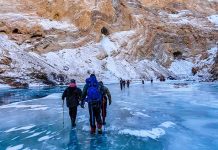The Indian Army is highly regarded for its professionalism, and humane approach. Three Chinese nationals, who got stranded at high altitude in Sikkim got a taste of the Indian Army’s professionalism and humane nature when their Volkswagen Tayron 330 TSI SUV broke down.
The Chinese nationals strayed into Indian territory after losing their way and to add to their woes, their SUV broke down, leaving them stranded at 17,100 feet, in extreme climatic conditions.

The Indian Army swung into action, and provided timely medical assistance to the Chinese nationals and helped them get back to their country. The Indian Army mobilized oxygen for the stranded Chinese nationals, apart from helping them fix their SUV and also provided the travelers food.
India and China share a border in Sikkim, a mountainous frontier state of India that has seen clashes between the Indian army and Chinese army at high altitude mountain passes of Nathu La and Cho La.
Such incidents of tourists getting stranded at high altitude is not uncommon. It’s very easy to lose way and sense of direction in the upper reaches of the Himalayas, where visibility is poor, weather conditions are rapidly changing and cellphone network is nearly non-existent. A few hours of exposure at high altitudes can cause death.

Also, the risk of acute mountain sickness – a life threatening condition caused due to difficulty in the human body adjusting to lower oxygen pressure at high altitude – is real. This makes travel to high mountain passes quite risky, especially when adequate precautions are not taken. Had the Indian Army not intervened in time and rescued the Chinese tourists, things could have taken a very bad turn for the stranded Chinese nationals.

Here are some tips that everyone traveling to mountains need to follow to stay safe, and also keep their vehicles safe,
1. Ensure that your vehicle is in good condition before taking a trip to the mountains. Getting timely help at high altitude is not easy. So, it’s even more important to venture out in a vehicle that’s in top condition.
2. Pick the right tyres for the trip, and ensure that the vehicle has the necessary tools (and a person with some basic mechanical knowledge) to fix minor breakdowns such as blown fuses and punctured tyres.
3. Keep a ‘high altitude survival kit’ handy in the vehicle. This can be a life saver if you lose your way or get stranded without help arriving quickly.
4. Drive cautiously, and give way to vehicles that are climbing. Carry snow chains in places that experience snowfall.
5. Stay well hydrated, and do NOT consume intoxicants.
6. Ascend slowly to minimize the risk of Acute Mountain Sickness (AMS)/High Altitude Sickness/Pulmonary Edema. It’s a good idea to start taking diamox tablets a couple of days before venturing on a high altitude drive to minimize risk of AMS. If someone experiences symptoms of Acute Mountain Sickness, stop ascending and descend from high altitude to the plains immediately.
Via ADGPI
Written By – Cartoq.


















